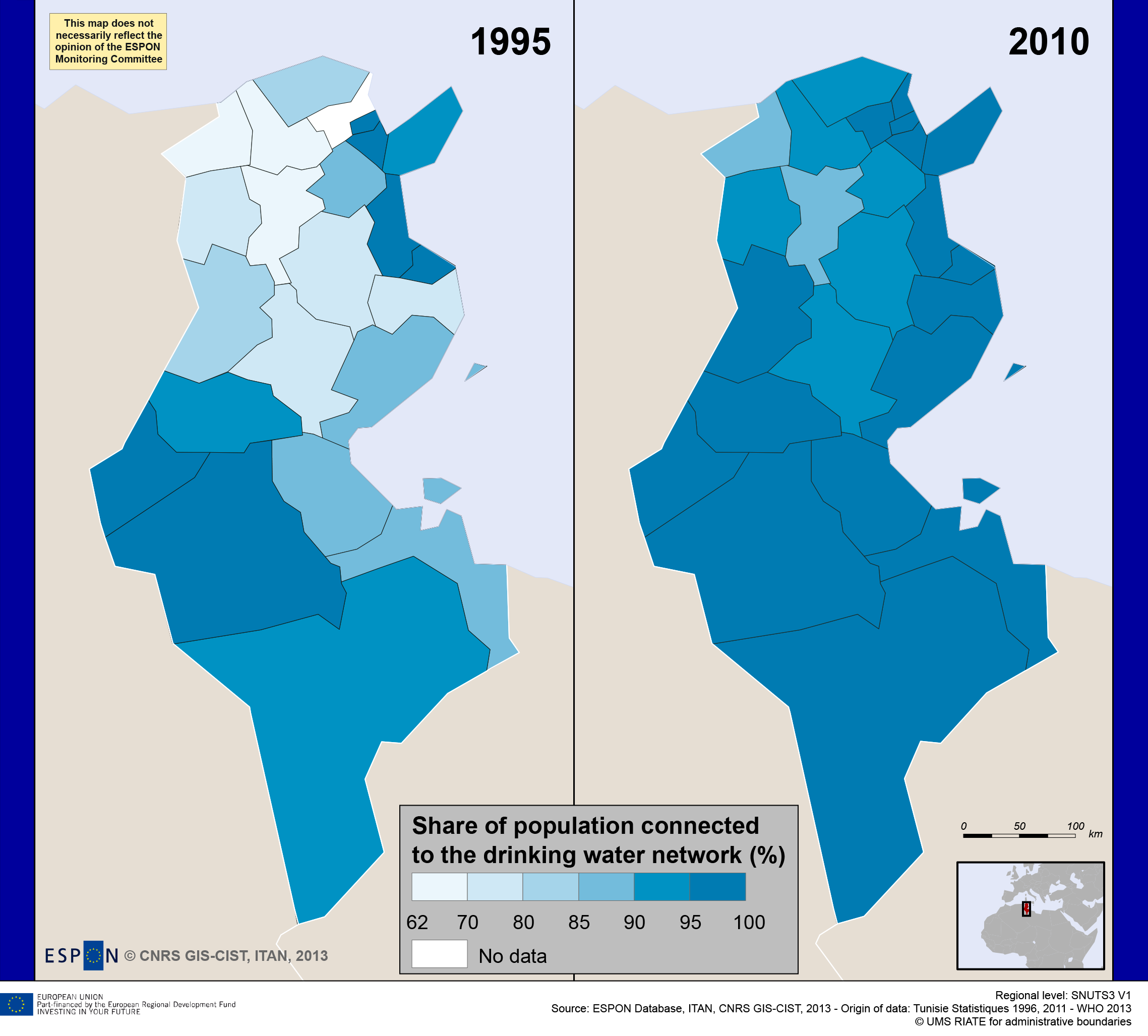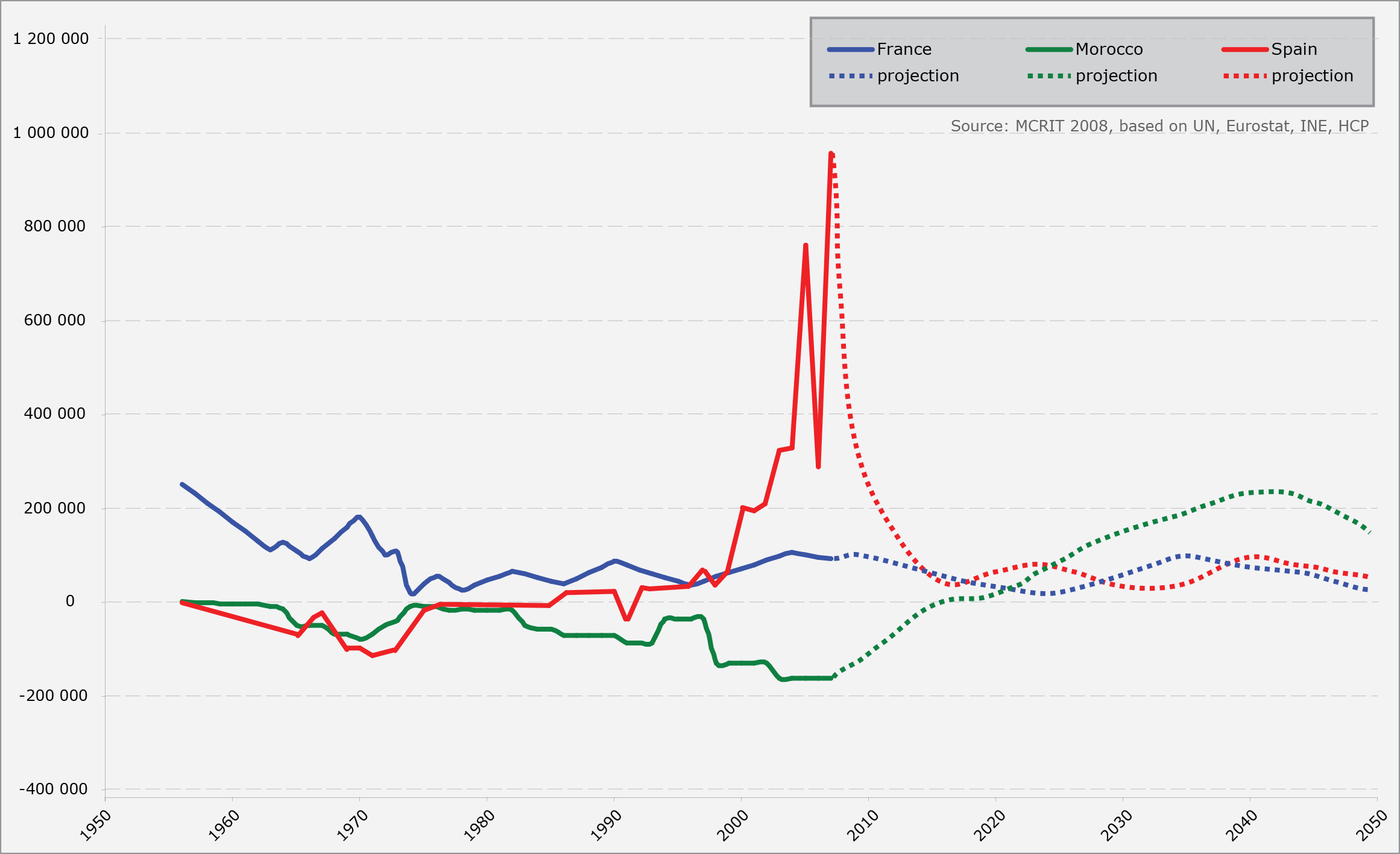ITAN in brief n. 4, Water & Agriculture, Key Issues for the Cooperation in the Mediterranean, October 2014
The ongoing exploitation of water is not sustainable
Climate change will highly impact European Neighbour Countries (ENCs), especially in the Black Sea area and the Mediterranean. Water shortage will particularly impact Egypt. The water exploitation index is high in Mediterranean water basins, and not only in the southern side: compared to available water resources, withdrawals have been historically high in the previous decades, especially in the Near-East, in Libya and Tunisia, but also in Greece and Spain. Available water resources are not sustainable in the South because they rely a lot on groundwater.
Today, water resources per capita are worrisome in the Mediterranean as a whole, especially in the South but also in Spain: the water issue is not only a Neighbour concern (Map 1). The current solutions are hardly sustainable. As an example, in Tunisia, which is one of the most efficient Arab countries in the field of water, improvement in drinkable water (Map 2) and sewage (Map 3) raises various problems: (i) ecological, since water resources are taken from non-recharged groundwater; (ii) managerial, since the know-how is lacking both in governance and technical aspects; (iii) political, since the modernisation of water service would need an increase in water tariffs that no government wants to assume; (iv) financial, since the needs for modernisation of the water service and above all of the sanitation infrastructure remain huge; (v) territorial, since the North-West of the country (water and sewage) and the South (sanitation) are lagging behind the North-East.



Mediterranean Neighbour Countries are already among the major cereals importers in the world
A research programme spearheaded by Inra & Cirad [2009] tracks the long-term trends of six major regions of the world and provides scenarios for agriculture and food through to 2050. Between 2003 and 2050, the population of the Middle East and North Africa (MENA) region is set to rise by 70%; food and agricultural demand (expressed in energy equivalents: vegetable and animal kilocalories) is expected to rise by 80%; due to expected improvements in product quality, the market in value terms will rise from 100 to 200% over the period. MENA region, some parts of which were ancient Rome grain basket, has become the region of the world with the highest level of food stress: in 2003, the gap between local resources and consumption hit 54% of the total supply, and by 2050 it is expected to more than double. On a per capita basis, by 2050 the gap will be three times greater than in Sub-Saharan Africa. Three factors explain this food supply crunch: the scarcity of land available for agriculture; the climate degradation and particularly the dramatic water shortage; the institutional weaknesses that are hampering technical and managerial progress in agriculture.


Table 1 gives numbers for cereals production and imports, according to four scenarios. The first scenario is the baseline and drives to a production per inhabitant of 80% compared to that of the 2000s, and to almost doubled imports. The third (severe climate change scenario) and the fourth (food trade total liberalisation) drive to imports multiplied by three compared to that of the 2000s. The combination of severe climate change and straight liberalisation would drive to mushrooming imports. The only scenario where production per inhabitant does not diminish and where imports remain bearable is that of a deep Euro-Mediterranean cooperation. Given the still great share of agriculture in employment in various Mediterranean European Neighbour Regions (ENRs), it is easy to understand that the future of their rural territories will largely depend on Euro-Mediterranean cooperation. Even in countries such as Algeria, where agriculture plays a minor role, this is a key issue because Algeria, thanks to its recent Politique de Renouveau Agricole et Rural, wants to reduce its dependence upon food imports and to enhance its agricultural sector which had been left behind in the first decades of the republic. It is easy to understand that the relevant European strategy should not be limited to export its food products to its Neighbours.

The issue of food will become a crucial problem for the whole region owing to (i) deteriorating ecosystems, global warming, reduction of available farming land and water resources, with serious effects on the potential of local production, which currently provides more than 25 million jobs in these Neighbour Countries; (ii) growing population in the South and East of the Mediterranean, with almost 400 million people to feed by 2030, (iii) rising nutritional imbalances and diseases linked to the gradual abort of the Mediterranean diet made of fruits, vegetables, olive oil and fish.

What cooperation between Europe and its Neighbour territories?
Avoiding water wars, turning the water concern into a strategic cooperation in the wider region
The Plan Bleu (1) estimates that the required amount to meet the need for access of all Mediterranean Neighbourhood people to fresh water is at least €15 bn, and €35 bn for sanitation. Even if it mobilises many donors and has an emblematic dimension, EU sanitation programme “Horizon 2020” will not face it since its budget is around €3 bn. Moreover, the cost of Mediterranean Neighbourhood adaptation to climate change could reach €30 bn in the two coming decades. This represents in the same time a tremendous stake and a major opportunity for business.
Of course water is a very local resource, but a regional cooperation could turn it from a political threat into an economical asset. The priorities are well known: efficient use of water and a water demand driven management; improved local and national governance in order to get clear contracts of water supply; pricing, that is economically appropriate, territorially efficient and socially fair; legal and financial security of investments to facilitate public-private partnerships, especially for sanitation. Since 1976, Mediterranean water issues have been at the centre of numerous debates, and yet results have not made much progress. What the region needs is a better coordination and an involvement of all concerned actors i.e. not only Water ministers but also Agriculture ministers since agriculture uses three quarters of these countries water, and Urban planning authorities as well as operators and local authorities.
What could be designed is a Mediterranean Water Agency (2). Its role would be to coordinate the actions of numerous institutions and NGOs focusing on water in the Mediterranean. The Agency’s charter would echo common principles about pricing and clear contracts which would need to be respected if projects want to receive funding from public and private international donors. Its missions would be information, promotion of new water practices for agriculture, exchange of experience and expertise, vocational training and research, hydro-diplomacy that is mediation on trans-boundary waters. When it comes to its governance, a Euro-Mediterranean Water Council could group representatives of Heads of state of participating countries, major towns in the region and directors of NGOs and institutions working with water in the Mediterranean, to determine the Agency strategic lines; in a second phase, the running of the Agency itself and its executive decisions could be entrusted to professionals representing basins or other relevant areas –and not the water public administration alone– covering all actions necessary for integrated water and sanitation management.
Is it idealistic? It is not: Mediterranean ENCs more and more adapt their regulation closer to the EC Water Framework Directive. They acknowledge that they need the European know-how. On the reverse way, European stakeholders acknowledge that there are business opportunities in the Mediterranean, that a good local governance of water management is an excellent way to promote citizen participation and democracy, and to avoid possible water wars.
A food security and agricultural policy
It has to be remembered that political unrest in Tunisia began a couple of years ago with riots due to bread price. If nothing is done, further social, economic and ecological disasters are inevitable. Europe needs to go beyond the discussions on Euro-Mediterranean free trade agreements that have been dragging on for thirty years. Experts and scientists (3) discuss the idea of a new Mediterranean policy for agriculture and food based on Europe half-century CAP (Common Agricultural Policy) experience: (i) encouraging in Mediterranean Neighbour Countries more local food production through significant investment in R&D and training, and by setting up inter-professional channels, plus regulations to improve product quality; (ii) promoting Mediterranean diet by educating, developing geographic labels and setting up communication plans around the world with a view to conquering markets; (iii) creating regional food security by stimulating North-South and South-South complementarities via mid-term supply contracts, security stocks of strategic products (cereals and oleaginous plants) and –why not?– Euro-Mediterranean commercial preference for all food products.
Is it idealistic? It is not: Central European States membership has been prepared and accompanied by a strong commitment of the EU vis-à-vis their agricultural and rural modernisation. Why would the methods of the CAP not be adapted to Mediterranean Neighbours, as it has begun to be thanks to the ENPARD (4) programme in Tunisia?
Notes.
1. The Plan Bleu has been launched by the UNEP Barcelona Convention for the Protection of the Marine Environment and the Coastal Region of the Mediterranean in 1976.
2. See Comair, F., Donzier, J-F., Hervé Lainé, Mino, E., 2010, “A Mediterranean Water Agency to move from strategy to action”, Ipemed, “Reports and syntheses”, Paris.
3. See Ciheam, 2008, “The Future of Agriculture and Food in Mediterranean Countries” Mediterra Report, Presses de Sciences Po, Paris.
4. ENPARD: European Neighbourhood Programme for Agriculture and Rural Development.

